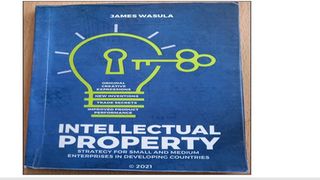
SMEs introduced to intellectual property to as a business tool
What you need to know:
- “SMEs are problematic to sustain and to grow because, among others, they lack favourable access to financing, they lack professional governance skills, and have limited budgets (if at all) for Research and Development,” Wasula adds
James Wasula’s new book is designed for Small and Medium Enterprises (SMEs) from developing economies and introduces them to the Intellectual Property (IP) system as a business tool that can enhance and diversify an SME’s business opportunities.
Titled “Intellectual Property: Strategy for Small and Medium Enterprises in Developing Countries” the book helps the reader understand what IP is, how it may be applied in business, and why it is very important to the SME in today’s knowledge-led economy.
The 180-page book published in 2021 introduces the reader to IP, with specific reference to business names, trademarks, trade secrets, copyright and related rights, patents, industrial designs, geographical indications, and utility models and their usefulness as a business tool.
It discusses how IP may be acquired, protected, and utilized in business including how it may be used to source financing and to enhance competitiveness of an SME in the domestic and international market place through an Intellectual Property audit system.
“To begin with, Intellectual Property is present in our day to day lives albeit with minimum or no attention given to it. For example, all businesses around us at least have a name. Most of them have Trademarks as well. Whereas some entrepreneurs may know why they have these two basics beyond just names and signs, the majority may probably not know. Yet this is the beginning of Intellectual Property as a business tool…,” Wasula writes.
The African continent is heavily reliant on its Small and Medium Businesses (SMBs), which are the backbone of the economy. A 2019 report by International Labour Organisation titled “Small Matters: Global evidence on the contribution to employment by the self-employed, micro-enterprises and SMEs,” indicates that SMBs contribute a remarkable 95 percent of total employment on the African continent.
According to Wasula, SMEs, sometimes referred to as SMBs are a lifeline to many people. SMEs are business enterprises that deal in businesses such as cottage industries, medium-sized industries, wholesale and retail shops, pottery, artifacts, handicrafts, carpentries and joineries, restaurants, salons, information communication technology, bakeries, and bars. They also include businesses run in small or home offices such as writers, system analysts, web or graphic designers, software designers and masons.
“They are relatively easier to start up and to run although in most cases they are very problematic to sustain and to grow. They are easier to start up because they require minimal capital and are not labour intensive. More often they are managed by the owners or members of the family,” Wasula writes.
“SMEs are problematic to sustain and to grow because, among others, they lack favourable access to financing, they lack professional governance skills, and have limited budgets (if at all) for Research and Development,” Wasula adds.
According to Wasula, “Most SMEs deal in restively the same products hence face stiff competition amongst themselves. With limited capacities and resources, most of them get stunted or outright go under.”
Managing IP assets is more than just the formal acquisition of the IPRs, Wasula says. “In order to reap full value from Intellectual Property assets, an enterprise must adequately exploit them through a well thought-out strategy informed by the overall Business Strategy of the enterprise.”
Wasula is advocating for the need for policymakers to develop more meaningful strategic policies that encourage growth-oriented SMEs in order that large firms evolve from the SMEs. “In most under-developed countries, most of the small businesses are informal mainly because of unfavourable policies and laws, coupled with lack of or inaccessible information, where the information exists. In some countries it is even impossible to clearly identify SMEs due to lack of data on such businesses.”
“Therefore, governments should put in place policies and laws that not only encourage SMEs to become formal, but also makes it easier to identify them. These include policies and laws regarding registration of companies, tax regimes, labour laws, easy access to finance, flow of and access to information, and consulting services,” he suggests.
According to Wasula, registration of businesses can be a hindrance to the growth of SMEs in any country, where the process is expensive, so bureaucratic, centralised, and lengthy. “Such frustrating systems are manifested by the fewer number of businesses registered as compared to the thriving informal and unregistered businesses out there.”
“It is therefore prudent to make appropriate policies and laws that make business registration easier and simple to enable informal entrepreneurs to formalise their businesses. Straight forward and less cumbersome procedures of registering a business also spur registration of new businesses,” he adds.
In his August 16, 2021 congratulatory letter to Wasula, the head of the Academic Institutions Programme at the World Intellectual Property Organisation (WIPO) Academy in Geneva, Switzerland, Joe Bradley writes: “…Your book addresses a gap in the available literature dealing with the management and use of IP by SMEs, particularly in developing counties. It will be an important contribution to the body of knowledge on IP and more specifically a valuable resource to SMEs, policy makers and academics working in this field.”
The book is available at major bookshops in Kampala at Ushs50, 000 ($13.5). It is also available online at Amazon.
Wasula is n IP expert who pioneered collective management of copyright and neighbouring rights in Uganda in the early 1980s. He is very passionate about IP, participated in drafting Uganda’s IP laws and the IP Policy, served on the Board of the African Regional Committee of the International Confederation of Societies of Authors and Composers (CISAC) as a Board Member and later as its Chairman. He is an alumnus of the WIPO Academy.




